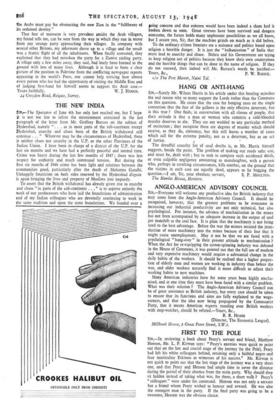ANGLO-AMERICAN ADVISORY COUNCIL
SIR,—Everyone will welcome any productive idea for British industry that may come from the Anglo-American Advisory Council. It should be recognised, however, that the greatest problems to be overcome in increasing our industrial productivity are not only technical, but also psychological. For instance, the advance of mechanisation in the mines has not been accompanied by an adequate increase in the output of coal per manshift at the coal face. It is plain that the machinery is not being used to the best advantage. Before the war the miners resisted the intro- duction of more machinery into the mines because of their fear that it might cause unemployment. May it not be that we are faced with a psychological " hang-over " in their present attitude to mechanisation ? When the Act for re-equipping the cotton-spinning industry was debated in the House of Commons, it was pointed out that the full use of modern and very expensive machinery would require a substantial change in the daily habits of the workers. It should be realised that a higher propor- tion of elderly men and women are working in industry than before the war, and older workers naturally find it more difficult to adjust their working habits to new machines.
Many American industries ha.ve for some years been highly mecha-
nised, and at one time they must have been faced with a similar problem. What was their solution ? The Anglo-American Advisory Council can be of great assistance to British industry, but every care should be taken to ensure that its functions and aims are fully explained to the wage- earners, and that the idea now being propagated by the Communist Party, that it means American experts standing over British workers with stop-watches, should be refuted.—Yours, &c., R. R. HOARE
(Director, The Economic League).
Millbank House, 2 Great Peter Street, S.W.1.


































 Previous page
Previous page